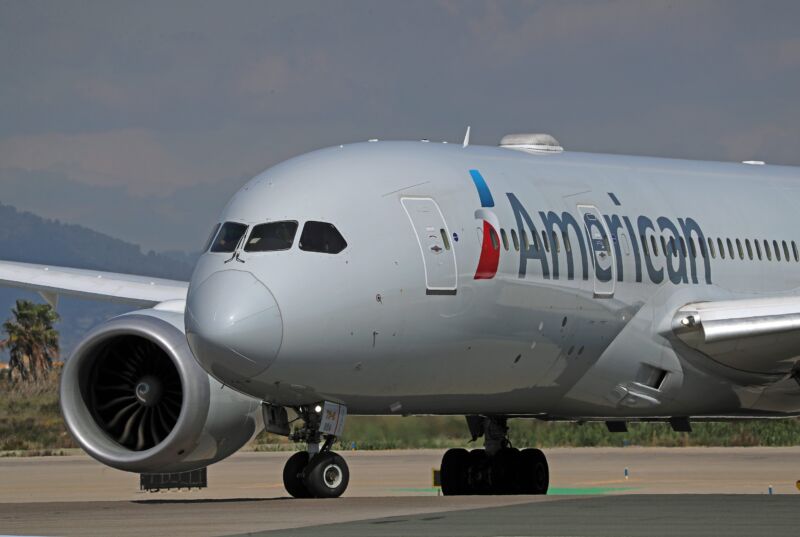
Getty Images | NurPhoto
The Federal Aviation Administration is investigating whether Boeing failed to complete required tests on its 787 Dreamliner planes and whether Boeing employees falsified flight records, the company said this week. The investigation began after an employee reported the problem to Boeing management, and Boeing notified the FAA.
“The company voluntarily initiated an investigation into Boeing in April that it may not have completed necessary inspections to ensure adequate bonding and grounding at the wing attachment point on certain 787 Dreamliner airplanes,” the FAA said in a statement. Presented to Ars today.
The FAA said it was “investigating whether Boeing completed inspections and whether company employees falsified flight records. At the same time, Boeing is still reviewing all 787s in the production system. The fleet.” “As always, we will take whatever action is necessary to ensure the safety of the flying public,” the agency added.
Boeing exec confirms missed tests
Boeing VP Scott Stocker, who leads the 787 Dreamliner program, described the “misbehavior” in an April 29 email to employees in South Carolina. Boeing provided Arce with a copy of the email.
“After receiving the report, we quickly reviewed the matter and learned that many were in violation of company policies by not performing the required testing but recording the work as completed,” Stocker wrote. “As you all know, we have zero tolerance for not following the processes designed to ensure quality and safety. We immediately informed our regulator of what we learned and are taking swift and aggressive corrective action with several teammates.”
Stocker’s email praised a Boeing employee, or “teammate” as he called him, for reporting the problem. “The teammate saw an anomaly appear during a required conformance check on the wing body attachment,” Stalker wrote. “He raised it with his manager, who brought it to the attention of executive leadership. I wanted to personally thank and commend those teammates for doing the right thing. It’s important that each of us speak up when we see something that can’t be seen. Right, or it needs attention.”
Boeing’s “engineering team has determined that this misconduct does not constitute an immediate safety of flight issue,” Stocker wrote. But there will be an impact on customers and employees “because testing now has to be conducted off-line in the process of building the planes.” Stocker urged employees to “ensure full compliance with our policies and procedures” and “speak up if you see something that doesn’t seem right.”
Dreamliner cockpit problem
In March, around 50 people were injured on a LATAM Airlines flight in which the Boeing 787-9 Dreamliner experienced a “strong shake” that reportedly caused some passengers’ heads to hit the ceiling. Boeing later “advised airlines to check cockpit seats on 787 Dreamliner jets after a seat crash that may have forced a pilot into restraints,” The Wall Street Journal reported. wrote.
The WSJ wrote that in the LATAM incident, “a flight attendant hit a switch on the pilot’s seat while serving food, which caused a motorized feature to push the pilot into the controls and push the plane’s nose down.” The switch on the back of the chair is normally covered and should not be used when a pilot is in the seat.
Boeing sent a memo to airlines “instructing them to inspect cockpit chairs for loose covers on switches and how to turn off power to the pilot’s seat motor if necessary,” the WSJ wrote.
Boeing study
Boeing has come under increased scrutiny since January, when a 737 Max 9 operated by Alaska Airlines was forced to make an emergency landing after a door plug exploded in mid-air. The National Transportation Safety Board found four bolts that were supposed to secure the door panel were missing.
The NTSB told U.S. senators that its door-plug investigation was hampered by a lack of repair records and security camera footage. Boeing could not find the recordings documenting the door plug and said it only keeps video recordings for 30 days before they are overwritten.
Boeing also withdrew its application for a safety waiver related to its 737 Max 7 aircraft after criticism from U.S. Sen. Tommy Duckworth (D-Ill.). Duckworth criticized Boeing for “preemptively allowing the 737 Max 7 to enter commercial service in order to gain an exemption from safety standards.”
Recent news reports detail the deaths of two whistleblowers, one who worked for Boeing and another who worked for a Boeing supplier. Former Boeing quality manager John Barnett He died in March A coroner said it “appeared to be a self-inflicted gunshot wound.” Barnett worked at Boeing for 32 years and “became a whistleblower at the South Carolina factory that makes the 787 Dreamliner” before resigning in 2017. Written by CBS News.
The second whistleblower death occurred a week ago. “Joshua Dean, a former quality auditor at Boeing supplier Spirit Aerosystems and one of the first whistleblowers to accuse Spirit leadership of ignoring manufacturing defects on the 737 Max, died suddenly Tuesday morning after battling a rapidly spreading infection,” The Seattle Times. Wrote last week.